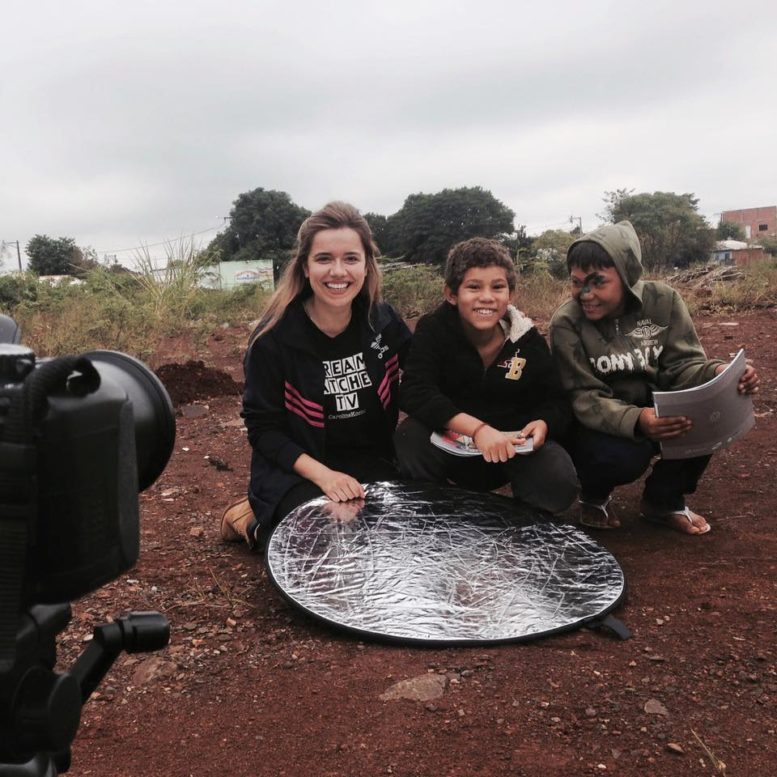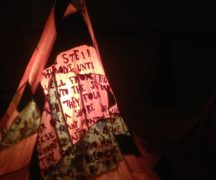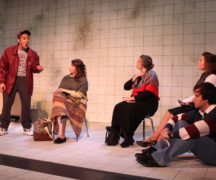By DAVID DUPONT
BG Independent News
At 23, Caroline Koziol has already lived a well-traveled life. Born in Poland, she immigrated to England. She came to study theater and film at Bowling Green State University for semester and stayed to graduate. Now she’s back in London doing graduate studies in film.
That’s just the outline. She’s hitchhiked along Route 66 and around Morocco. Her dreams have also taken her to the slums of Brazil where she found the subject for both a documentary and a book.
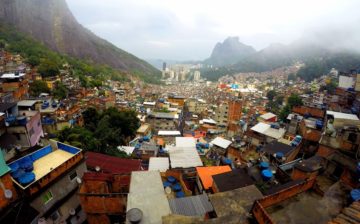 Koziol’s ambitions to be a documentary filmmaker revolve around the Dream Catcher project, where she approaches strangers and explores with them what their dreams and fears are, and what they are doing to achieve them. She found people who dream of fame and a lottery jackpot. She found someone who wanted to have a cup of coffee with her, and a man who thought she should run for president.
Koziol’s ambitions to be a documentary filmmaker revolve around the Dream Catcher project, where she approaches strangers and explores with them what their dreams and fears are, and what they are doing to achieve them. She found people who dream of fame and a lottery jackpot. She found someone who wanted to have a cup of coffee with her, and a man who thought she should run for president.
She probes and encourages and teases her subjects, justifying her intrusion in their daily life with a beaming smile and bubbly repartee.
It’s an approach that works across cultures.
Koziol tells those she meets the time to start pursuing their dreams is now. And she practices what she preaches.
Koziol discussed her life’s journey in a series of e-mails from London.
The idea for the Dream Catcher project was born in Grounds for Thought one weekend while she was a student here. “There was this enormous world map on one of the walls. I was staring at this map and an idea sprang to mind – I study filmmaking, love to travel and people,” she wrote. “Those were my three biggest passions in fact. Combine the three and you get to start making documentaries.”
Koziol decided to start her Dream Catcher Studio, where she could make and produce films and music videos. The idea was to educate by showing viewers “different cultures, different ways in which people live their lives.”
She also wanted to talk to people and motivate them.
 “Life is wonderful and gives us plenty of opportunities,” she said. “I noticed just how many chances we get in life and decided to take my life into my own hands and never give up.
“Life is wonderful and gives us plenty of opportunities,” she said. “I noticed just how many chances we get in life and decided to take my life into my own hands and never give up.
She’s loved movies since she was a child in Poland. “Acting and more broadly filmmaking was always a magical process to me. Even when I was very little,” she wrote, “I was never scared of horror films, because I imagined how it was made, analyzed the acting.
“Making films gives us a chance to live again, she continued. “Especially when it comes to documentaries. You have the opportunity to show to the world what the world looks like.
“I remember once, as an 11-year-old-girl, I watched a documentary about the ‘green lungs of our planet’ – the Amazon rainforest. It fascinated me that someone could reveal to me a different culture and a whole new world. It was at that point that I decided I, too, would devote my life to showing people those inaccessible corners of the world.”
She enjoyed her time here in Bowling Green. The town was friendly and open, and she met people from around the world.
This helped embolden her for her most adventurous project yet. She and three colleagues took a summer trip to Rio d Janeiro with the intent of creating a Dream Catcher movie in the city’s notorious favelas, or shantytowns.
Despite the dangers from crime and language barriers, they tapped into the dreams and aspirations and fears of these people, just as they had elsewhere.
According to Koziol: “The people who live in favelas are very happy people who got unfairly treated by life. They appreciate what they have and enjoy each day. They value their families and helping each other out a lot. After seeing those people completely happy in their life I discovered that happiness doesn’t depend on any external conditions, it is governed by our mental attitude.”
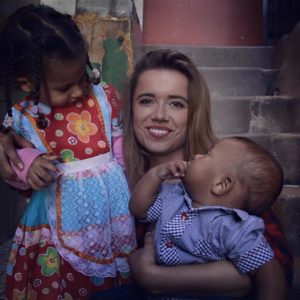 Still the journey was not without its trials. “There were plenty of situations that were very dangerous,” Koziol wrote. “For instance the day before we were supposed to talk with the mafia. That day I was very scared something bad would happen to us, that I was being very naïve. I decided to take the risk anyway. And I don’t regret it, because they turned out to be just lost boys with guns, who had no better choice in life.”
Still the journey was not without its trials. “There were plenty of situations that were very dangerous,” Koziol wrote. “For instance the day before we were supposed to talk with the mafia. That day I was very scared something bad would happen to us, that I was being very naïve. I decided to take the risk anyway. And I don’t regret it, because they turned out to be just lost boys with guns, who had no better choice in life.”
The six weeks in Rio de Janeiro left their mark on her. “After spending time there, I felt a certain catharsis,” she wrote. “That’s very important in traveling – to feel that inner cleansing within you and being able to say to yourself ‘Wow, I have a really wonderful life. Life is a wonderful journey.’”
Back in England, the young filmmaker put her memories and reflections on paper. Those she shared with her father who showed them to a publisher.
The Polish language version of the book will be released in a few months. The English version, “’Dream Catcher in Brazilian Slums,” will come out later in the year.
Koziol came away more convinced of her vocation as a documentary filmmaker. Documentaries have the power of reality behind them.
The film is a more elaborate endeavor than the 11-minute one she made of her travels in Morocco, so it will take longer to produce.
But she works every day to make the dream of seeing the dreams of the residents of the favelas brought to the screen.
Her own dream, shaped by talking with so many people about their own, is relatively simple. “My greatest dream is to always be happy with the person I see in the mirror.”

